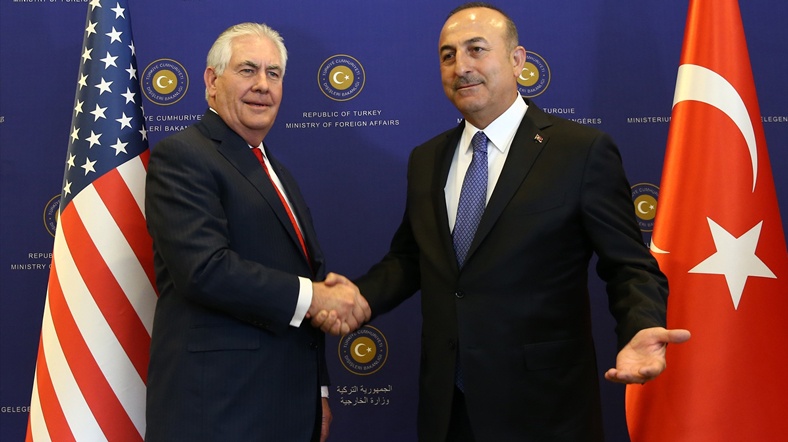During Tillerson’s Visit, Turkey, US Pledge to Work Together in Syria
After weeks of diplomatic wrangling and verbal squabbles, Turkey and the United States pledged to work together in northern Syria through establishing a mechanism to keep a lid on brewing tension that might inadvertently escalate.
U.S. Secretary of State Rex Tillerson’s Turkey trip has begun with a meeting with Turkish President Recep Tayyip Erdogan on Thursday about around 3.15 hours, longer than expected.
In a hugely unusual break from protocol, the only other official present at Mr. Tillerson’s meeting with Mr. Erdogan at the presidential palace was Mr. Cavusoglu who also acted as translator, U.S. sources said.
Today, Secretary Tillerson held a bilateral meeting with #Turkey’s President @rt_erdogan and Foreign Minister @mevlutcavusoglu in Ankara to discuss a range of bilateral and regional issues. pic.twitter.com/HCRtipL96N
— Department of State (@StateDept) February 15, 2018
After a separate meeting with his Turkish counterpart Mevlut Cavusoglu in Ankara on Friday, Mr. Tillerson said the two sides would set up working groups to solve key issues that have bedeviled relations. They gave few details on how this could be achieved but indicated that solving a dispute over the control of the flashpoint town of Manbij was a priority.
“We are not going to act alone any longer, not the U.S. doing one thing, Turkey doing another,” Mr. Tillerson said after the talks. “We will work together… we have good mechanisms on how we can achieve this, there is a lot of work to be done,” he added.
"The U.S.-#Turkey relationship is too important to do anything other than concentrate on how we move forward." — Secretary Rex Tillerson today on the path forward for U.S.-Turkish relations pic.twitter.com/W1VWsPS2YL
— Department of State (@StateDept) February 16, 2018
Mr. Cavusoglu said Turkey and the U.S. were agreed on the need to normalize relations. He said that ties were at a “critical phase” and vowed to create “mechanisms” to discuss the issues that were causing problems.
A prime task of Mr. Tillerson on his trip to Ankara is to allay Turkish anger over U.S. policy in Syria, a dispute which has ignited the biggest crisis in bilateral ties since the 2003 Iraq war. Washington has warned that Turkey’s operation against the People’s Protection Units (YPG) Kurdish militia in the Afrin region of Syria risks distracting from the fight against jihadists.
Mr. Tillerson called on Ankara to “show restraint in its operation” while insisting that Turkey and the United States “share the same objectives in Syria.”
‘Solve Manbij’
Analysts say the level of tension was similar to 2003 when Turkey refused to let U.S. troops operate from its territory for the Iraq war or even the aftermath of Ankara’s intervention in Cyprus in 1974.
Turkey’s operation against the YPG, which Ankara blacklists as a terror group, has seen Turkish troops fighting a militia which is closely allied with the U.S. in the battle against the Islamic State.
For Ankara, the YPG is a branch of the outlawed Kurdistan Workers’ Party (PKK), which is blacklisted as a terror outfit by the U.S. and the E.U.
Mr. Erdogan this month upped the ante by warning U.S. troops to leave Manbij, a YPG-held town east of Afrin, raising fears of a clash between the allies. The United States has a military presence in Manbij. He even warned that the U.S. risked being dealt an “Ottoman slap” in Syria — a backhand thwack which, according to legend, could kill an opponent at a stroke.
But Mr. Tillerson added that Turkey and the United States had to solve the tensions surrounding Manbij as a “priority”.
“Manbij is going to be given priority in our joint working effort,” he said.
The town was once held by ISIS before they were pushed out by Kurdish militia and Mr. Tillerson said it was vital it did not fall again into jihadist hands.
In a joint statement, Washington and Ankara agreed they would “decisively stand against all attempts to create faits accomplis and demographic changes within Syria” as part of their commitment to the preservation of Syria’s territorial integrity.
“The Turkish government chose to have a cordial tone with Tillerson, and refrained from repeating earlier insults and threats aimed at the U.S. We must wait and see whether the tone of the talks also translates into concrete steps for cooperation in the days to come,” Aykan Erdemir, a former Turkish lawmaker and research fellow at Foundation for Defense of Democracies, told Globe Post Turkey.
Detained U.S. citizens
The squabble over Syria is, however, just one of a litany of issues burdening Turkey-U.S. relations.
Ties were damaged after the failed coup of 2016 with Turkey stung by a perceived lack of U.S. solidarity and angered by Washington’s refusal to extradite Fethullah Gulen, a Pennsylvania-based cleric accused of ordering the putsch. The cleric denies the accusations.
Mr. Tillerson has also urged the release of Turkish citizens who have been caught up in the post-coup crackdown.
Last week, NASA scientist Serkan Golge, a dual national, was jailed for seven-and-a-half years for being a member of Gulen’s movement. US pastor Andrew Brunson, who ran a church in Izmir, has been held on similar charges since October 2016.
Still, despite all the positive flavor attached to Mr. Tillerson’s visit, tough challenges remain ahead for improving ties.
“Ultimately, anti-Americanism is an effective tool for Erdogan to mobilize voters in the run-up to 2019 elections,” Mr. Erdemir said.
He added: “I do not believe that he would be willing to abandon such a useful asset, especially at a political juncture where his reelection anxieties dominate over all other policy issues. I wouldn’t be surprised if Turkey’s pro-government media returns to its systematic smear campaign by targeting U.S. individuals and institutions in a few days.”




Comments are closed.